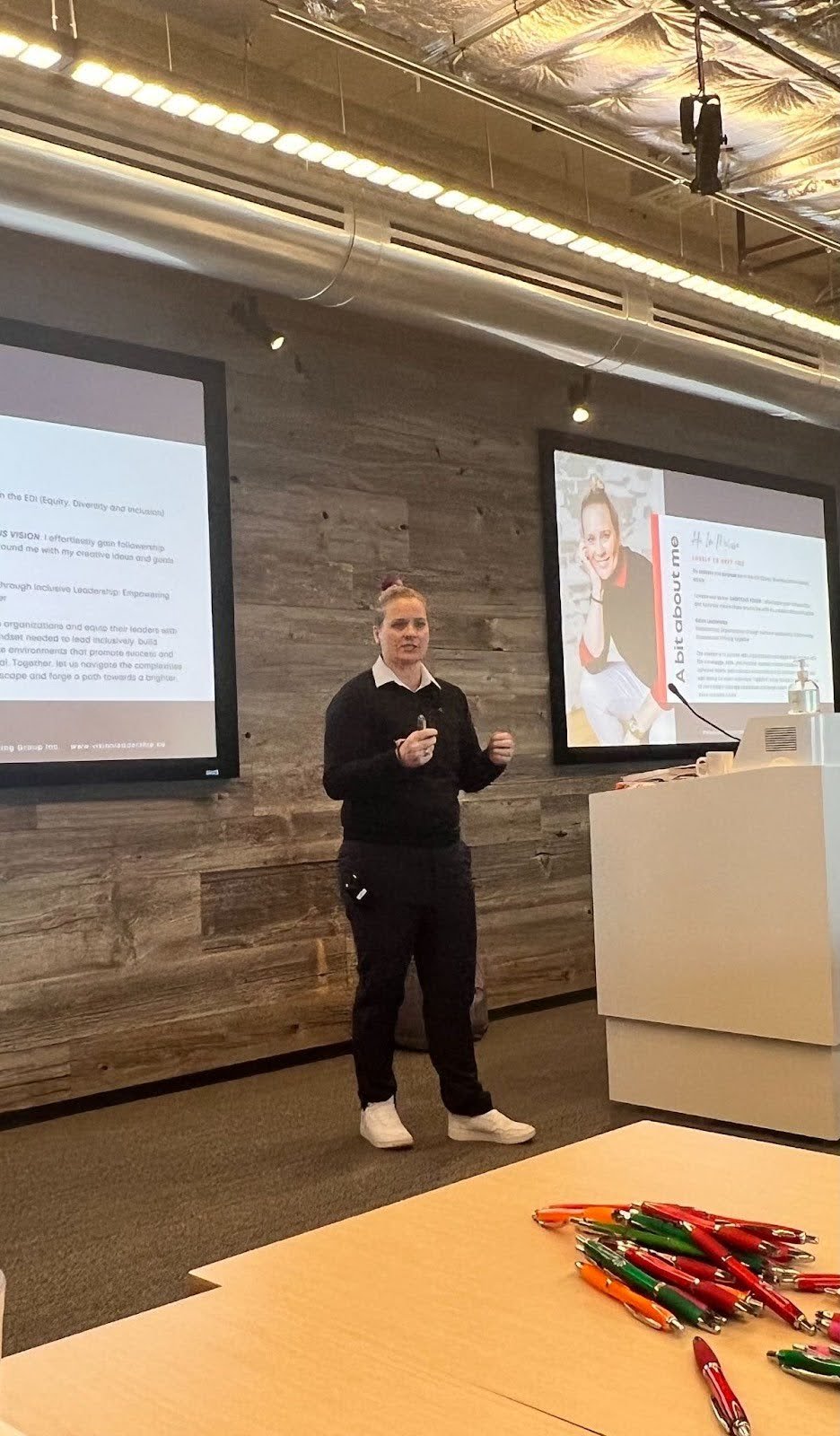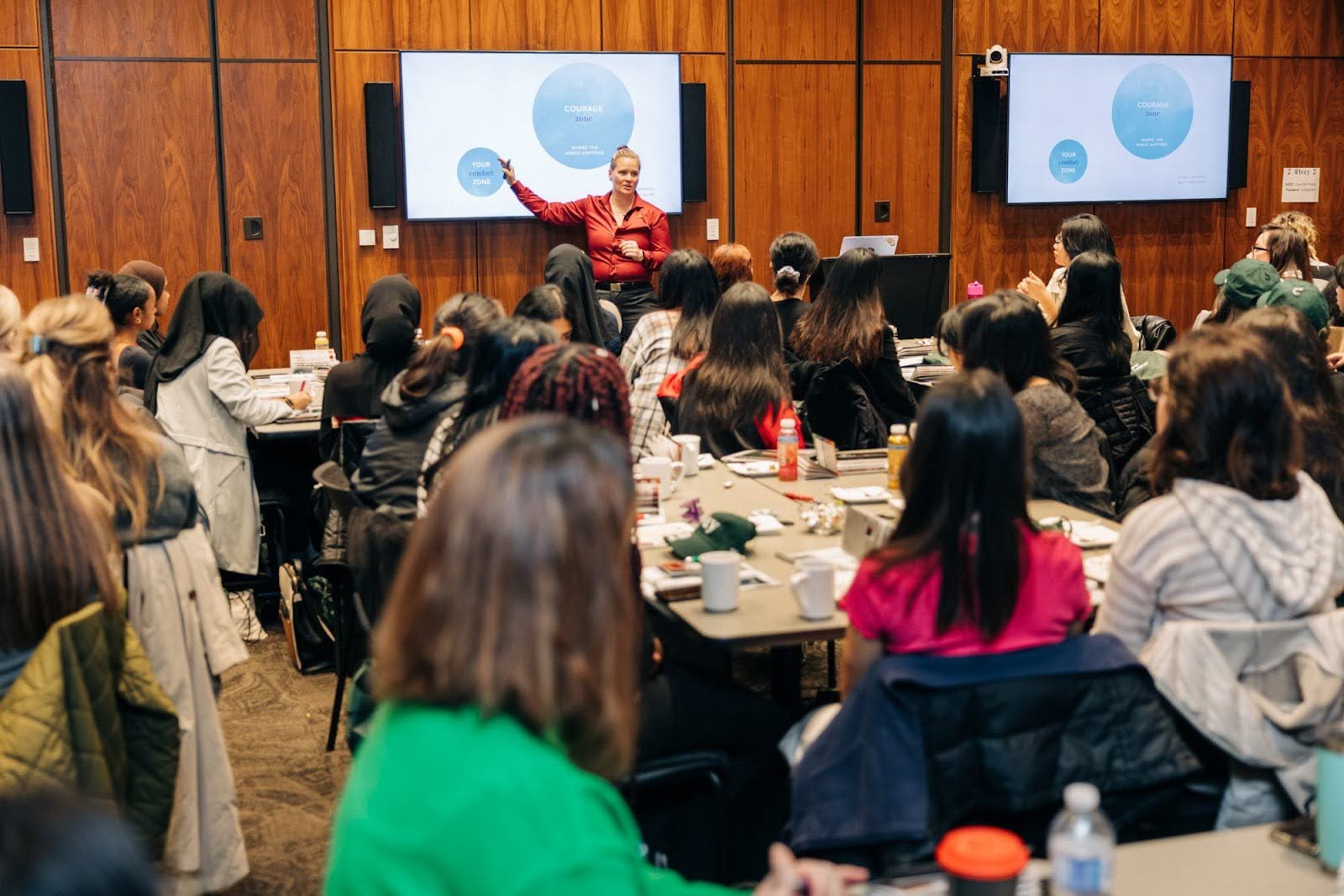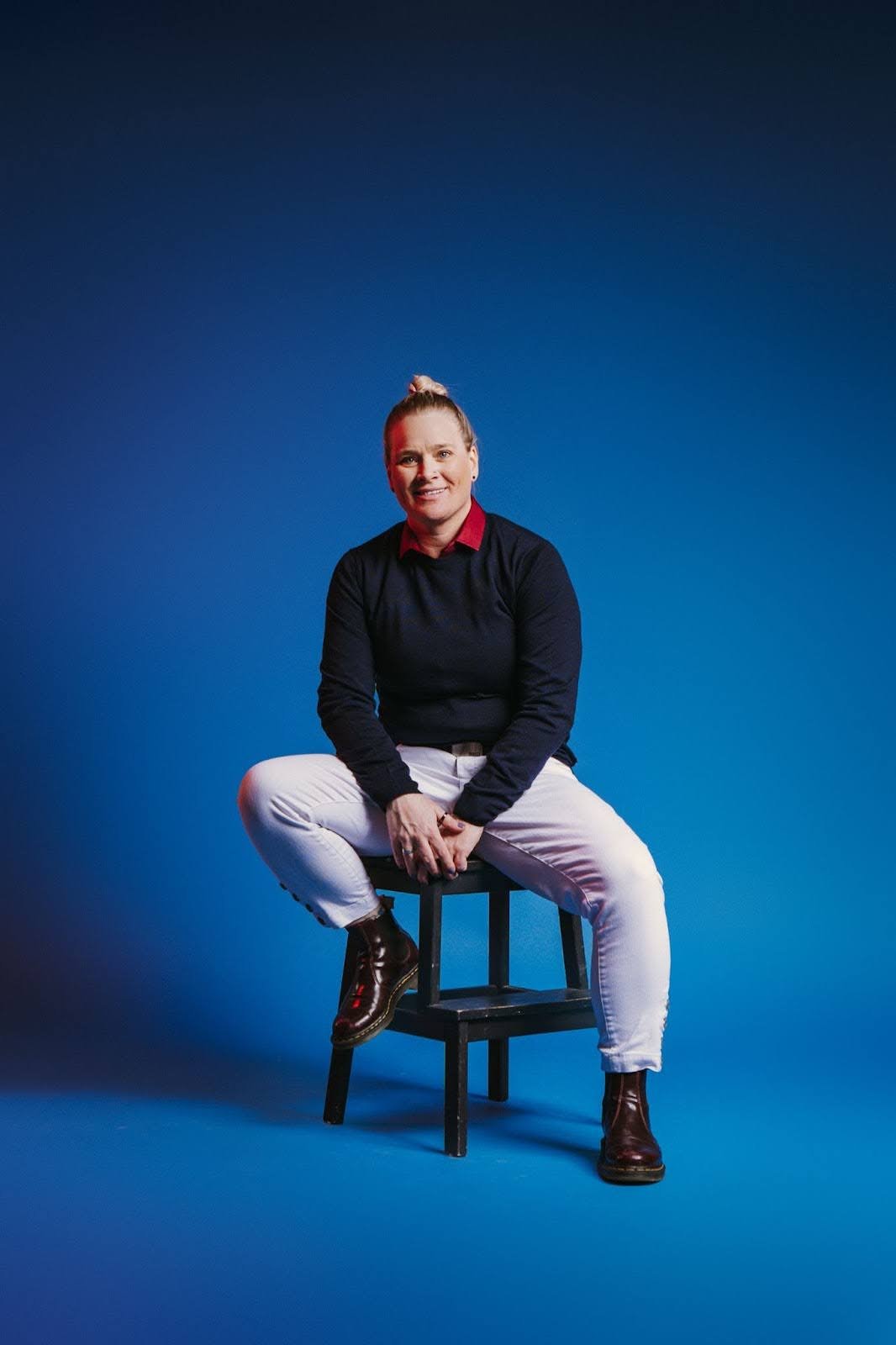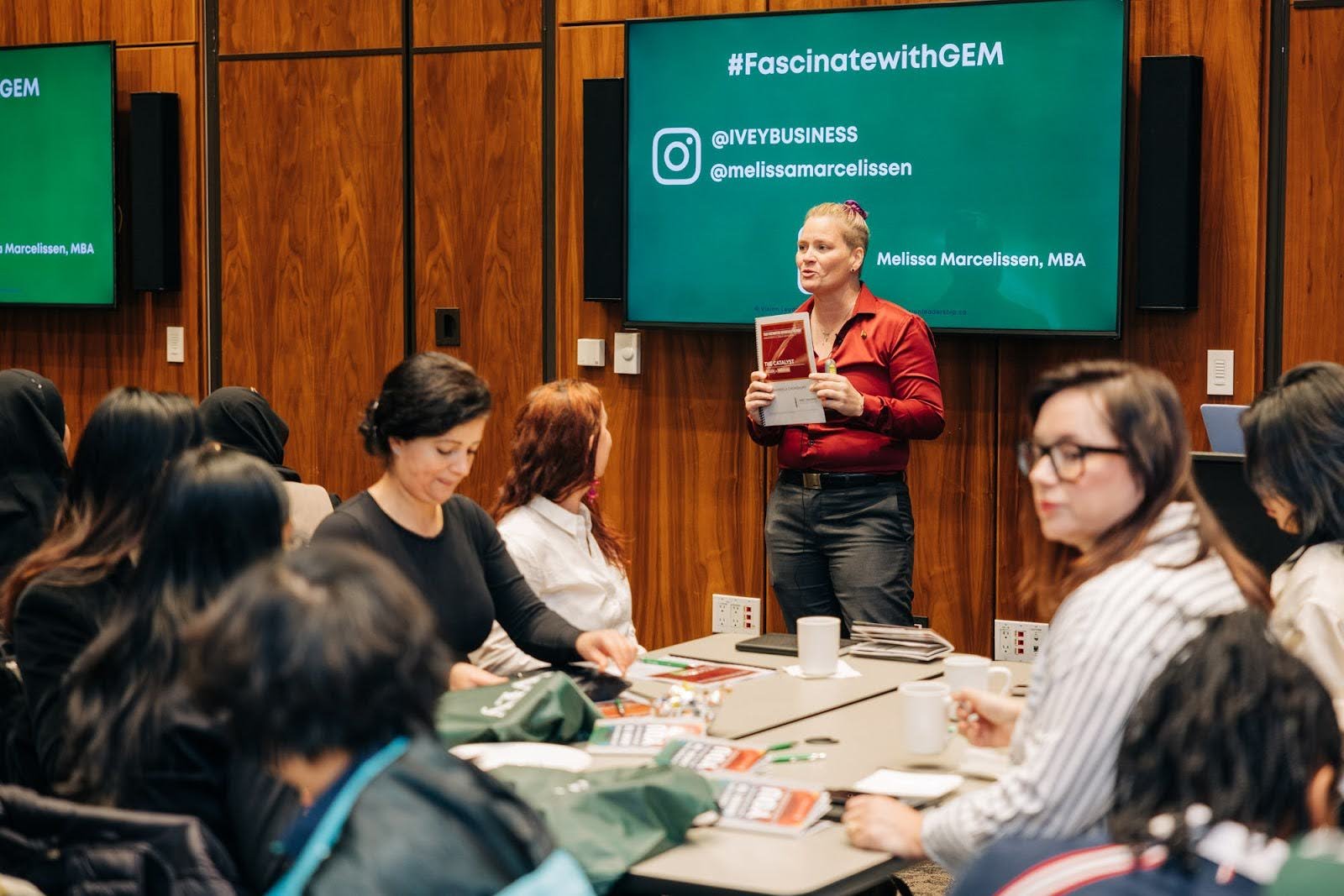Navigating the Path to Inclusive Leadership: A Conversation with Melissa Marcelissen
Written by Valiski Bernard
In today's rapidly evolving business landscape, the role of leadership has never been more crucial. But what if leadership could be more than just guiding teams towards goals? What if it could be a catalyst for positive change, a force that celebrates diversity and empowers individuals to be their authentic selves? This is the philosophy behind Vision Leadership, a consultancy that specializes in Inclusive Leadership development.
Melissa Marcelissen
At the heart of Vision Leadership is Melissa Marcelissen, whose personal journey led them to believe strongly in the power of inclusive leadership. Their extensive background spans over 20 years in the corporate world, where they’ve worn multiple hats as sales and operations leader, human resources business partner, and advisor-coach to C-suite executives. After completing their EMBA, they realized that the impact they wanted to make could only be achieved by stepping away from their corporate career and into the world of inclusive leadership development. For them, inclusive leadership was not just a career choice; it was a calling, a way to make a meaningful difference in the world. Melissa also recently started a podcast intended to spread the message of Inclusion and Leadership even further called “Belonging Is A Verb,” as well as a DBA (Doctoral Business Administration) at Royal Roads University.
Through Vision Leadership, Melissa offers bespoke solutions for organizations of all sizes, working with leaders at every level to unlock the power of diversity. They believe that by embracing and valuing differences, leaders can create stronger, more resilient teams that are capable of achieving remarkable things. Let’s delve into their remarkable journey.
Personal Journey to Vision Leadership
After finishing their Executive MBA, Melissa discovered their passion for inclusive leadership development consulting. They strongly believed in the power of leadership and wanted to make a meaningful impact by helping organizations embrace inclusivity. This realization led them to establish Vision Leadership, where they focus on empowering leaders at all levels to unlock the potential that lies in our differences. For Melissa, inclusive leadership is not just a career path; it's a mission to change the world.
“I often say Inclusive Leadership saved my life, and I believe it can change the world.”
Approaches of Vision Leadership
Vision Leadership employs various educational approaches to promote inclusive leadership. Melissa conducts workshops, engages in extended programs, and delivers compelling keynotes to leaders and organizations. Through these mediums, they aim to educate and inspire leaders to embrace diversity, authenticity, and the power of differences within their teams. Melissa is certified to deliver How to Fascinate Assessments, Ivey Business School’s Character-Based Leadership Framework and Assessments, and the Learning Agility Index developed at Columbia University. These assessments provide valuable insights and help in developing targeted leadership development programs.
“Showing leaders how they add value in unique ways helps them understand and value how their team members are different and how that makes the team better—offering delivery through team workshops, extended engagements, and compelling keynotes for leaders or full organizations. I work with organizations to create custom Leadership Development programming, leverage Learning Agility tools to assess top talent and provide targeted development to historically underrepresented talent within organizations to ensure executive pipelines are full of diverse leaders of the future. Compelling keynotes for leaders, ERGs (Employee Resource Groups), Women’s Groups, and 2SLGBTQIA+ folks on how to embrace what makes them different, to lean into authenticity, and to own their potential.”
The Challenges
When starting Vision Leadership, Melissa encountered the challenge of sharing their services and clearly defining how their consultancy could help organizations. Despite receiving endless moral support and having Ivey Business School as a critical anchor client, Melissa aimed to expand their impact further. Their goal was to grow the work with leaders and teams, ultimately including robust programming delivered by additional consultants and facilitators.
“I think early on, every time I got to book a call or provide a proposal, I thought that meant I would get to do the work - I’d get very excited and then experience a huge letdown and loss of confidence if I didn’t end up booking the work. I have gotten much better at understanding sometimes no means not right now, and even if a solution I have offered isn’t a good fit, it isn’t a rejection of me personally. I’m still in the early building stages, so it can be hard to create consistent pipelines of work. I’d be very happy if I was booked for 20 keynotes a year or delivering 2-4 workshops/month, but growth and scaling take time. Remaining positive and committed to the change you want to see is critical.”
Approaching Resistance to Inclusive Environments
Melissa addresses the challenge of reaching individuals who do not recognize the need for inclusive environments. They acknowledge that many individuals, including those with discriminatory attitudes, may not perceive themselves as such or feel the need to change. They emphasize the importance of meeting people where they are and ensuring that efforts towards Equity, Diversity, and Inclusion (EDI) are not diluted or harmful. Melissa also stresses the need to make content approachable yet meaningful for individuals new to EDI concepts, facilitating allyship and organizational commitment as initial steps towards broader inclusivity.
“As humans, we are not well equipped to be self-aware. I have found focusing on the organizations and leaders who are ready to make change has helped me sustain momentum and ensure that the tools needed to make real change are in the hands of those who already see the value but need help with execution. I think it is important to meet people where they are and ensure that EDI work is not watered down or harmful to those at the highest risk while also being mindful that gaining allyship and organizational commitment is the initial goal. For many who do not immerse themselves in this space or for whom EDI concepts are new - making content approachable while still meaningful and effective is key.”
Rewarding Moments
Melissa reflects on the rewarding nature of their work, particularly in their role at Ivey as a Coach & Relationship Manager to Executive & Accelerated MBAs. The experience is described as a gift, showcasing the profound effect of mentorship and support on individuals' personal and professional development. This highlights the power of acknowledging and embracing differences, leading to transformative experiences in both careers and personal lives.
“I consider myself so fortunate to be able to do work that is so rewarding all of the time. In my role at Ivey as a Coach & Relationship Manager to Executive & Accelerated MBAs, I’ve had several students share at the end of their program that they may not have completed the program if not for the conversations we had as they were starting or early in the program - often these are women in the program and seeing them grow into more confident versions of themselves never ceases to amaze me. Getting to witness the transformation and growth is such a gift. Within team workshops, seeing leaders and employees light up with excitement when sharing what they are passionate about, what makes them unique and what they add to their team is so powerful. So many of us do not know how to, or even think, we shouldn’t talk about what sets us apart - giving permission to embrace differences and unique contributions can be career and life-changing!”
Empowerment Through Education
Education is a powerful tool that can transform lives and open up opportunities. For many individuals, the decision to return to school is driven by a desire for personal growth, career advancement, or the pursuit of a passion. For women, especially those from marginalized communities, education continuity plays a crucial role in breaking barriers and creating a more inclusive society. For Melissa, their journey of returning to school highlighted the pivotal role education played in their life. Despite not pursuing higher education after high school and starting a career in financial services, Melissa realised that not having a formal education was hindering their advancement in certain roles.
“I did not go to university or college following high school; I was married at 19 and started working in financial services. I had made it to a place in my career where I had seen success and advanced fairly quickly, but I was running into roles where not having an undergrad or formal education could start to get in the way. After taking back my life, pursuing my MBA was just such a natural first step. I found quickly that it not only filled the gap in my resume, but even more so let me experience something I missed out on in my younger years. The relationships I built while in the EMBA are no doubt life long and so critical to me being able to fiercely go after my goals. The network that came along with my degree is what made me confident in venturing into entrepreneurship.
I do struggle with the need to emphasize continued education for traditionally underrepresented or underfunded groups - women and Black women specifically are among the highest educated groups, and yet, the gender gap is exponentially worse for this group. Continued education, especially mid-post-mid career, can be very beneficial to build confidence, gain access to strong networks and further develop skills. Women do tend to rely on their hard work and results when it comes to advancement, waiting to be selected or championed to higher-level leadership roles. Advancing education can provide the confidence to take control of one’s career and to start advocating for oneself. “
Living Authentically
Melissa believes being open about who we are in a corporate setting is crucial for creating an inclusive and supportive work environment. When individuals feel comfortable being their authentic selves at work, it fosters a culture of trust, respect, and acceptance. This not only benefits the employees who can openly express their identity but also the organization as a whole.
“For me, being openly queer at work is important because I hope that those earlier in their career can find acceptance in seeing successful, happy, and fulfilled queer folks - that representation really matters. I think it would be naive to say it is absolutely safe for everyone to come out at work. I often say the only person I had to “come out” to was myself; once I understood who I was, I was pretty quick to be very open in every aspect of my life. I do look back, however, and see that I was already quite stable in my career by that point - if I had been as open with my identity and my neurodiversity earlier in my career, I’m not sure I would have had the immediate acceptance that I have been so lucky to experience. It is also worth noting how many folks like me do end up opting out of the corporate career path - disproportionately Black and other women of colour, trans and queer folks, and women leave organizations to start their own businesses, often quite successfully - which is great for us/them but is creating a vacuum in leadership pipelines. If we can’t make workplaces equitable so that everyone wants to engage in advancement, I am worried we will look back in 10, 20, or even 30 years and still be asking ourselves why we can’t seem to make significant progress toward equality.”
Being your authentic self is sometimes an act of courage because it involves being vulnerable about your identity. It takes immense strength to share personal aspects of yourself with others, especially when there is a fear of rejection or discrimination. By “coming out,” individuals are not only being true to themselves but also paving the way for greater acceptance and understanding in society. It is a powerful declaration of self-acceptance and a step towards living life on your terms.
“You really never know how those around you are going to respond. You don’t know if, in that moment, you will lose relationships, if people will see you differently who have known you for many years, or if there is judgment hiding beneath the surface.
There is a scene in the movie “Happiest Season” where Dan Levy’s character shares this about coming out:
“My dad kicked me out of the house and didn’t talk to me for 13 years after I told him.
“Everybody’s story is different. There’s your version, my version, and everything in between. But the one thing that all of those stories have in common is that moment right before you say those words when your heart is racing, and you don’t know what’s coming next. That moment is really terrifying.
“And then once you say those words, you can’t unsay them. A chapter has ended, and a new one’s begun, and you have to be ready for that.”
This is probably the best I’ve ever heard that fear of the unknown described: Even when you are 99% sure you are safe with someone, you just don’t know.”
Advice and Insights
“Lean into your network. If you have struggled with and haven’t learned how to ask for help, make sure you work on this first. You need to be able to share your work, ask for business, and say yes when people offer to help. Build a personal “board of directors” with people you trust and that can help you with the things you don’t know. Finding other entrepreneurs is also very helpful. Early days can be quite lonely, so building a community will help keep you going.”
Melissa shares insights into their approach to self-care and mental health, highlighting the importance of understanding their recovery needs after engaging in keynotes, where they vulnerably share personal stories. While this vulnerability is impactful, it requires a period of self-care and reflection, with Melissa blocking out a day or two following events to prioritize their well-being. This practice underscores the significance of recognizing and honoring your emotional and mental needs, especially after moments of vulnerability and intense engagement.
Melissa reflects on their journey of letting go of unhealthy corporate expectations, which previously dictated that working long hours at their desk was synonymous with hard work. Over three years, Melissa has shifted this mindset, recognizing that productivity and dedication can manifest in various forms. They acknowledge that work is not confined to the traditional office setting, understanding that planning content during walks, building relationships while socializing, and ensuring they are well-rested all contribute to their ability to deliver value to their clients. This shift in perspective emphasizes the importance of holistic well-being and self-awareness in maintaining a sustainable and fulfilling work-life balance.
Defining Success
“Doing work that is fulfilling while being able to support myself and my kids. Steady growth and always working towards the next big goal.”
Melissa Wants You To Know
“I’d love to meet with you and talk about what's working and what isn’t on your team or in your workplace. Maybe there is an opportunity for us to work together on those pain points, or maybe you have a story to share for the podcast; either way, I always value connecting with ambitious folks and learning about what they do and why they do it!”
Melissa's journey underscores the importance of living authentically and embracing EDI in the workplace. By openly sharing their personal experiences and advocating for inclusivity, Melissa highlights the transformative power of leadership in creating supportive and accepting environments. Their commitment to empowering individuals to be their authentic selves serves as an inspiring example of how inclusive leadership can drive positive change. We thank Melissa for sharing their valuable insights and for championing a more inclusive and equitable future for all.





